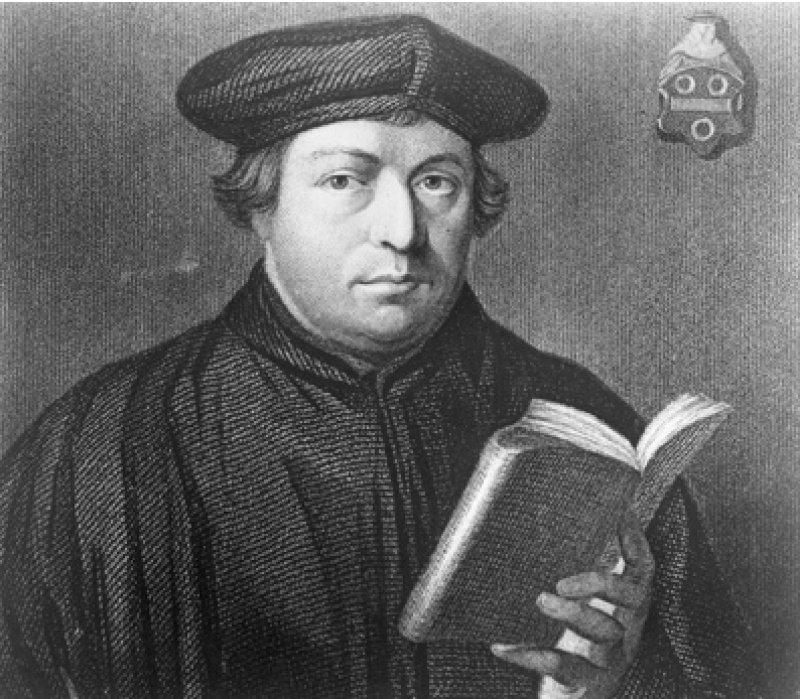

Thesis 1.
The law of God, the most salutary doctrine of life, cannot advance man on his way to righteousness, but rather hinders him.
This is made clear by the Apostle in his letter to the Romans (3:21): "But now the righteousness of God has been manifested apart from the law." St. Augustine interprets this in his book "The Spirit and the Letter' (De Spiritu et Littera): "Without the law, that is, without its support." In Rom. 5:20 the Apostle states, "Law intervened, to increase the trespass," and in Rom. 7:9 he adds, "But when the commandment came, sin revived." For this reason he calls the law "a law of death" and "a law of sin" in Rom. 8:2. Indeed, in 2 Cor. 3:6 he says, "the written code kills," which St. Augustine throughout his book "The Spirit and the Letter' understands as applying to every law, even the holiest law of God. (LW:31. 42-43)
In my last column, I explained that the 28 theological theses of the Heidelberg Disputation (1518) can be divided into four general sections. Now, we will examine the first thesis of the first section (the Problem of Good Works: Thesis 1-12).
The question with which Luther had wrestled in the late medieval age is the question we have identified as lying at the heart of the Christian doctrine of justification: What is meant by righteousness itself? What advances sinners on the way to righteousness before God?
In the Roman Catholic Church of the late middle ages, the righteousness (justice or equity) could be understood as the secular way. It means rendering good for good and evil for evil. On the basis of this understanding, the Roman Catholic Church had taught people that God gives grace without fail to the man who does what lies within him (homini facienti quod in se est Deus infallibiliter dat gratiam). Therefore, the Christians who lived in the middle ages thought that the good works done in obedience to divine law must be the way to righteousness.
From the very start, Luther argued that the law cannot advance us to righteousness. Even more surprising is that the law is not a remedy for sin; rather, it only makes matters worse. According to the proof of the first thesis, St. Paul also clearly states that the righteousness before God comes "apart from the law." Following St. Paul, Augustine in his book The Spirit and The Letter interpreted it as "without its support."
At first glance, Thesis 1 looks as if it follows the teaching of the antinomian or Gnostic - they denied the law - as heresy of the early Church. But in fact, Thesis 1 is the clear explanation for the role of the law. In other words, the very law of God, "the most salutary doctrine of life" revealed our sins and called ourselves to question as if a criminal was arraigned in court. The law finishes its work in exposing sin. Therefore, the law has no power to save and cannot advance man on his way to righteousness. The most significant factor is that Luther is talking about those who stand under the revealed law of God, the people of God, not those outside.
It is commonplace among Christians to believe that we cannot be saved by performing the law. However, we often try to assume that we automatically do the good works if we are saved; pastors unconsciously preach to congregations that God is delighted with our good works which help us to be saved. Here is a good example of this:
In a 36 second clip from a sermon by Victoria Osteen, the wife of Joel Osteen who is the Senior Pastor of Lakewood Church, the largest Protestant Church in Houston, Texas, she declared, "So, I want you to know this morning: Just do good for your own self. Do good because God wants you to be happy "¦ When you come to church, when you worship Him, you're not doing it for God really. You're doing it for yourself, because that's what makes God happy."
The common assumption in Church and Theology is that we must try to at least do something, and then Christ will make up for our "shortcomings." The messages in Church are filled with doing something, "God already gave you His grace, so you are not a sinner. Your good works are needed for salvation." Pastors, as well as theologians, no longer deal with "sin' and "death'. Rather they prefer to use the term "inner wound' and "inner healing' due to the influence of practical theology, especially Christian Counseling.
However, Luther is simply saying: "No. Doing the law does not advance the cause of righteousness, but it only makes matters worse."
By revealing our sin in detail, the law enables us to stand before God as the one who does not boast about the good works but seeks only His grace. God, that is, insists on being related to us as the giver of the gift. It is a sheer gift to be received only by faith, by being called into relationship as an entirely passive receiver. We must stress this aspect.
Therefore, the first thesis is a powerful message for those who try to weaken God's grace by emphasizing good works. The theologian of glory may say that the law helps us to cure, but the theologian of the cross should say, "the law can't save us." Knowing this is the first step to go the way of the cross.

Reverend and Doctor Jin O Jeong is an assistant pastor for Korean congregation at Zion Lutheran Church, Belleville, IL. He graduated from Luther University and received a Ph.D from Yousei University. He was also a Research Fellow at Hebrew University and Visiting Scholar at Yale Divinity School. Tel: 618-920-9311 Email : jjeong@zionbelleville.org



















